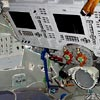Interview with Mark - 13 April
Questions by Will Knight, New Scientist
Question: Do you see yourself as a scientific researcher rather than a tourist, given the activities you have planned?
Answer: Yes! I'm not a scientist, nor am I a professional astronaut, but I'm definitely not a tourist. This is a personal challenge and dream, but through that dream we've tried to achieve similar goals in SA as the public space agencies achieve in their countries: to use space to provide a platform for science and education. I think there will be a huge market for space-based tourism, but it's not the objective of my project to demonstrate that. Rather, I'd like to show that private and public cooperation can help push back the frontiers of space faster.
Question: How will the scientific experiments you have planned provide better data than previous scientific experiments aboard the ISS?
Answer: We won't know until after the flight. We've taken the best proposals from SA, together with the years of experience of our Russian hosts, and done the best we could in a limited time. We're taking some very new technology into space, which makes for an interesting experimental mix but certainly gives us fewer guarantees of specific results. I'm optimistic that everything will work as planned, and we will really learn a great deal about stem cells, HIV proteins, muscle damage and energy expenditure from the flight. The science teams have worked flat out for many months, and I'll do my best during the flight.
Question: How do you see space science developing in light of commercial space travel, based on his experience preparing your experiments?
Answer: There has been a great fuss about Russia 'leading' in the race to provide commercial access to space. I don't think that's the case at all. The real hurdle, the real prize, is the development of privately owned launch and return capability. As soon as we cross that line, I believe we will see a virtuous circle, with private launches providing a much lower-cost avenue for the certification and testing of equipment that will be used in the public space programmes. That will allow NASA and RosAviaKosmos and other public agencies to push back the frontiers of space faster, and at lower costs, than they can do today. As a private space industry emerges, it will free the public agencies to focus on the edge of the envelope, while commercial space travel provides large scale investment into basic technology. And of course, space science will ride on the outer edge of that virtuous circle too.
|
|






